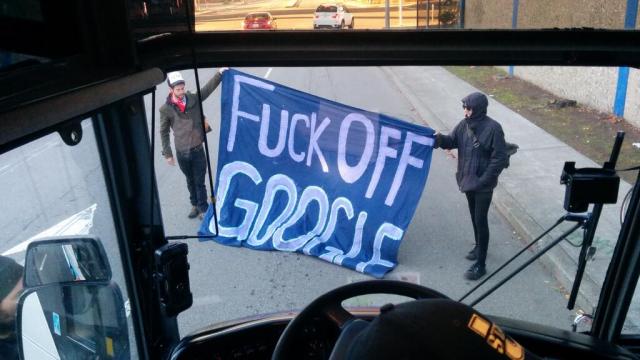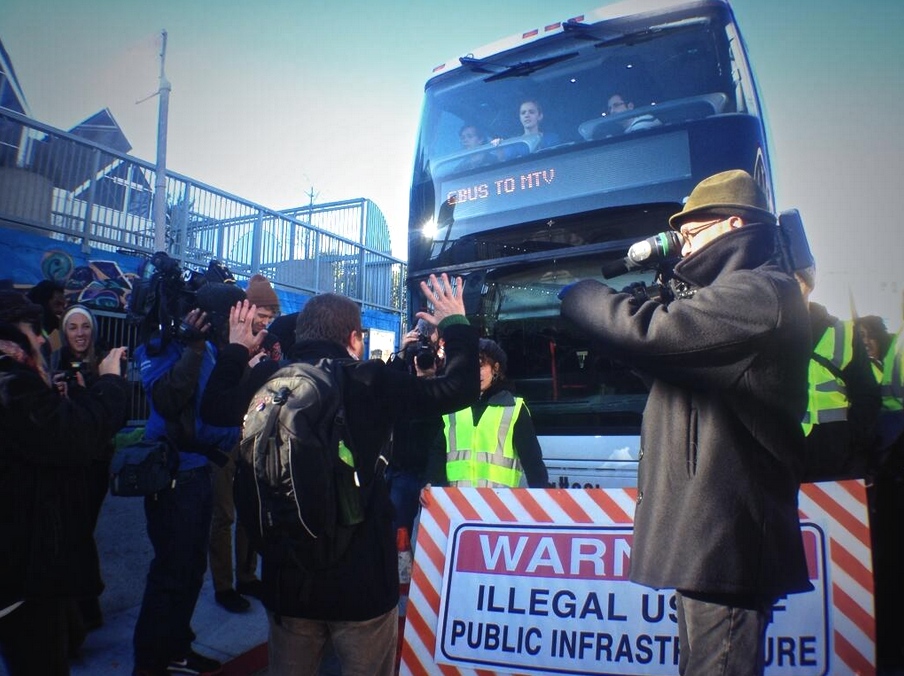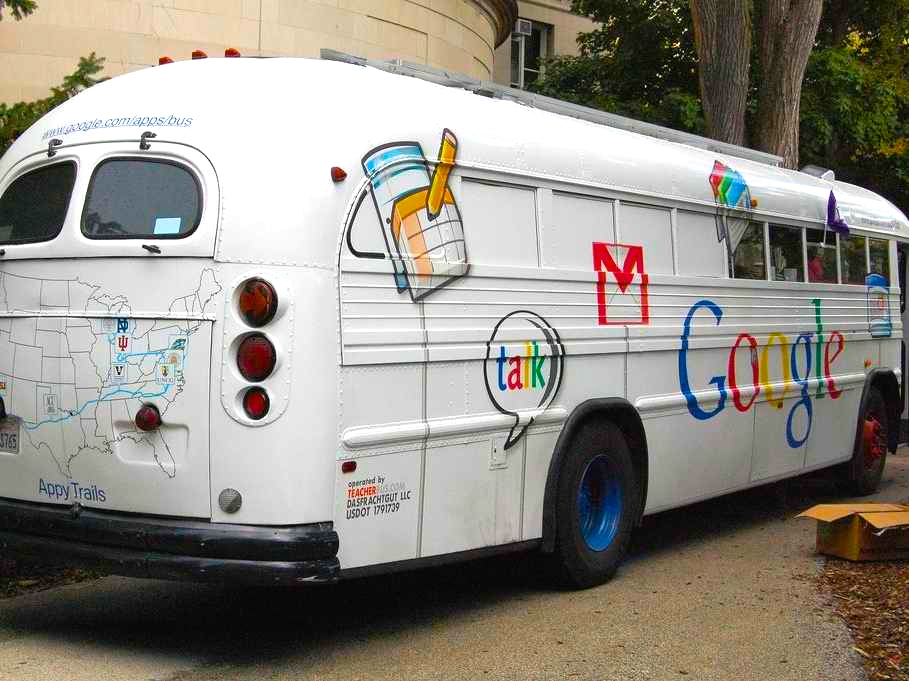
SAN FRANCISCO – Google buses are eluding state-mandated environmental analysis and are in violation of state law every time they stop to pick up tech employees at a public bus stop, according to a lawsuit filed last Thursday by a coalition of labor, housing and activist groups.
The groups are accusing the City of San Francisco of bypassing laws that forbid non-public transportation vehicles from using the stops in what has become a heated battle over gentrification – and the special privileges granted to technology companies – in the Bay Area.
The lawsuit, led largely by the Service Employees International Union Local 1021, was filed against Google, Apple, Genentech and other large Silicon Valley companies. It also lays blame on Mayor Ed Lee, the Board of Supervisors and the San Francisco Municipal Transportation Agency (MUNI), which are named as defendants.
San Francisco’s Matt Dorsey, a spokesman for the City Attorney’s Office, said late last week that he had not seen the complaint and therefore could not comment on the lawsuit.
The lawsuit marks the latest stage in a conflict highlighting the growing disparity between average workers – who are struggling to make ends meet and keep up with the skyrocketing rents in America's most expensive city – and the employees of giant tech firms who earn plump salaries and get shuttled in private buses an hour south to their campuses in Silicon Valley – increasingly known as Inequality Valley.
The lawsuit comes specifically in response to the city’s new “deal” with Google and other companies that would grant them access to some 200 stops across San Francisco and the region at a price tag of $1 per stop. People angered by the overbearing buses, the congestion – and not least of all by the soaring rents that come with the techies – have formed organized coalitions in protest.
Now, that despite the $1 per stop fee set to go into effect July 1, they say the buses are still in plain violation of state law there as there has been no independent environmental analysis of the buses to date.
The SFMTA board of directors previously found the city was exempt from the requirements of the California Environmental Quality Act. But activists and SEIU Local 1021 appealed the ruling. The Board of Supervisors voted 8-2 to deny the appeal and moved the plan forward despite widespread public opposition.
“When tech buses use residential streets and those with bike lanes, it makes our roadways more dangerous for pedestrians and bicyclists,” said Cynthia Crews of the Coalition for Fair, Legal and Environmental Transit. “When tech buses are loading in a red zone, it wreaks havoc on traffic and delays Muni.”
But Google remains steadfast behind its argument that the private shuttle service for employees saves more than 20,000 metric tons of carbon dioxide per year – the equivalent of taking about 4,000 cars off the road each day.
SEIU Local 1021 spokeswoman Alysabeth Alexander says that perspective tells one side, but fails to recognize the thousands of workers who have been “forced from their homes and are now driving back into the city in order to work."
Now, the new “commuters” are creating an environmental backlash to the “green” bus program that Google promotes.
Many residents support taking legal action to halt the city's rapid gentrification – especially when it's a matter of tech workers earning so much that they have driven up rental prices and forced families out of their homes as a result.
One bookstore worker said that he “fears the day I see a Google bus drive down this street because it means we are all in trouble.”
“The suit alleges that the project is in violation of the California Vehicle Code which prohibits any but common carriers (public buses, school buses) to pull into red zones, designated as bus stops," according to a press release issued last week by the activists fighting the tech buses. "The suit also alleges that City abused its discretion and violated the California Environmental Quality Act by exempting the Shuttle Project from environmental review.”
Rent prices have increased across San Francisco and the Peninsula heading toward San Jose by some $1,500 in the last several years, according to local statistics. Specifically, in June of 2011, according to priceonomics.com, the median rent price for a one-bedroom apartment in San Francisco was $2,195. Two years later, the price had jumped 27 percent to $2,795.
The price of a two-bedroom apartment rose 33 percent – or almost 10 times the rate of inflation during that period. As a result, families that have called the area home for decades are now being forced to look elsewhere, farther away from their places of work, in order to cover their basic needs of food and housing.
Alexander, from the SEIU, told Occupy.com that the city's refusal to take the inequality crisis seriously until now stems from the fact that Google and other tech giants are widely viewed as job creators – and that elected officials across the city and state, many of whom receive campaign contributions from those companies, are unwilling to break those profitable relationships for the sake of average residents.
The conflict has created a growing aura of misinformation, with local media articles citing the disappearance of cars from the road as a positive sign and lashing out at protesters who “don’t get it” that gentrification is a normal process in San Francisco, for many decades running.
Current MUNI commuters pay $2 per ride in the city. That means, with a daily average of 160,000 MUNI riders, the city is earning hundreds of thousands of dollars each day. The MTA proposal for Google, Apple and other Silicon Valley companies slaps an estimated $100,000 annual fee on larger companies and $80,000 on smaller ones – the new cost of using city streets and bus stops.
While Google argues its buses aren't to blame for the explosion of rent prices in the city, it seems more than coincidence that the most desirable, affluent areas of San Francisco all happen to be near a Google bus, or G-Bus, stop. These include South of Market (SOMA), the Financial District, Russian Hill, Pacific Heights, Lower Pac Heights, Noe Valley, Nob Hill and the Mission.
Google also claims that without its luxury buses taking employees south to work, Googlers would no longer live in San Francisco. By this rationale, the company says its buses offer a "green" transit solution. However, a recent report from the University of California, Berkeley, argued the opposite.
Danielle Dai and David Weinzimmer of Berkeley's Department of City and Regional Planning wanted to know how the shuttles influence Silicon Valley workers in deciding where to live and how to get to work. Dai and Weinzimmer questioned riders about whether they would move closer to work if the shuttles were discontinued. Only 40 percent said they would.
Now, rather than in the streets, it appears the next stage of battle over the tech buses will happen inside a courtroom.
3 WAYS TO SHOW YOUR SUPPORT
- Log in to post comments













